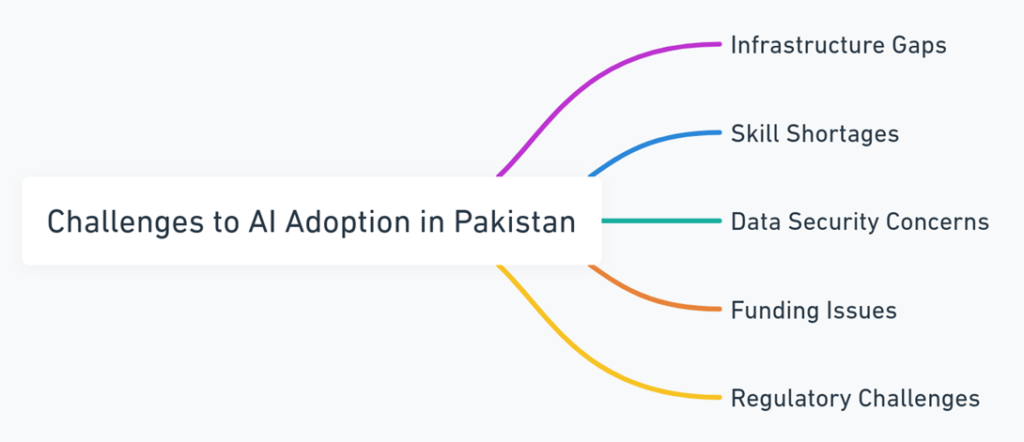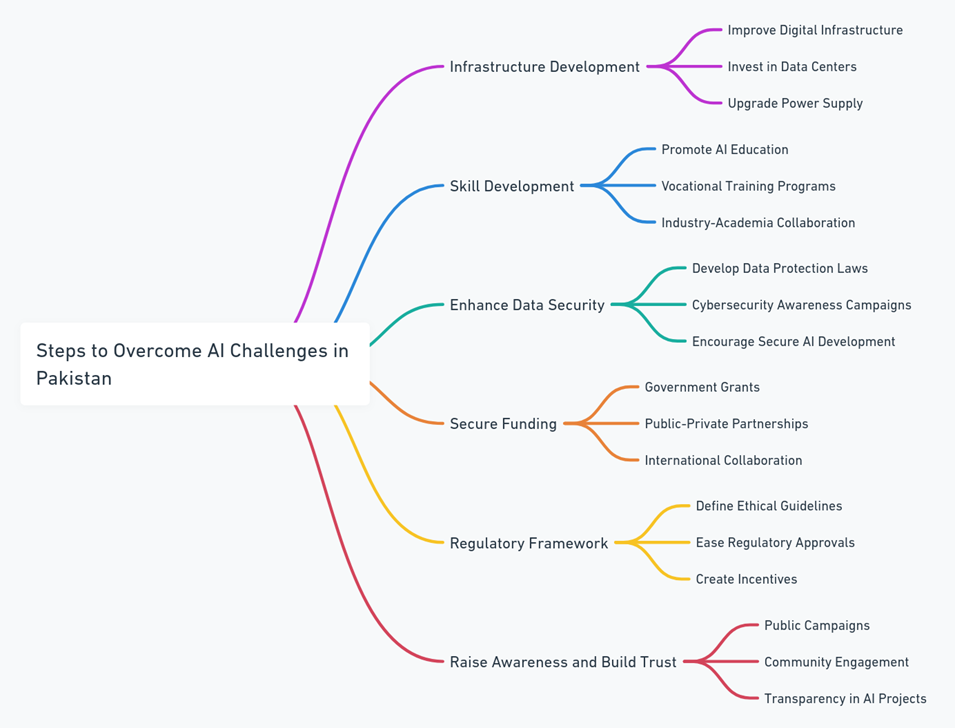


Artificial intelligence (AI) is a monumental force at the frontier of the Fourth Industrial Revolution, transforming industries and reshaping societies globally. As nations worldwide channel vast investments into this groundbreaking technology, ethically developing and implementing AI becomes imperative, ensuring its immense benefits are fully realised while minimising potential risks. For Pakistan, embracing and tailoring insights from international AI strategies can illuminate the path toward cultivating a robust, ethical, and inclusive AI ecosystem.
1. Learning from Global Ethical AI Strategies
The United States has emerged as a leader in artificial intelligence innovation through initiatives such as the “American Artificial Intelligence Initiative,” which underscores the importance of ethical and trustworthy AI practices. This initiative has expedited research and application development progress by promoting collaboration between federal agencies, private sector entities, and academic institutions. In addition, its strategic emphasis on ethical frameworks ensures that ETHICAL AI research and development adhere to the principles of fairness, transparency, and accountability, which are fundamental democratic values (United States’ National AI Strategy).
Korea’s National Strategy for Ethical AI exemplifies a model for how technological advancements can address societal requirements. Incorporating ethical AI into emergency assistance frameworks, notably ethical AI-enabled speakers for older people living independently, accentuates its capacity to improve public welfare by notifying emergency services during health emergencies. Furthermore, Korea fosters interdisciplinary collaboration through initiatives such as the “AI Olympics,” which stimulate innovation and creativity (AI G3).
Similarly, Singapore has established itself as a leading entity in the global AI landscape by focusing on scalable solutions that produce substantial social and economic benefits. The National AI Strategy delineates transformative initiatives, such as the prediction of chronic diseases, thereby demonstrating the ability of ethical AI to improve public healthcare systems. Furthermore, Singapore’s dedication to cultivating public trust through transparent governance frameworks ensures that AI technologies are efficient and reliable (Singapore’s National AI Strategy 2.0).
China’s next-generation AI development plan highlights the nation’s focus on achieving technological self-reliance and attaining a global leadership position. China is at the forefront internationally in AI patent filings and the development of its talent pool, reflecting its strategic investments in innovation. Furthermore, substantial investments in manufacturing and smart cities exemplify China’s aspiration to integrate AI across its economic framework (ROBO-DOC) fully.
2. Ethical AI and Its Importance
Ethical AI stands as a formidable pillar in the ever-evolving technological landscape, ensuring that revolutionary systems are meticulously crafted to uphold the pinnacle of moral principles, fiercely safeguard human rights, and ardently champion inclusivity across all fronts. The omnipresence of ethical conundrums, such as the pernicious spread of algorithmic bias, alarming invasions of privacy, and the relentless spectre of accountability issues, underscores the urgent and undeniable need for robust governance structures. Pioneering nations like Singapore and the United States have compellingly demonstrated that these formidable challenges can be deftly navigated and surmounted through visionary comprehensive frameworks, embedding ethics as the very core and essence of Ethical AI governance and operational strategies, a testament to their unwavering commitment to ethical integrity (Ethical AI Frameworks).

The World Economic Forum Framework for Developing a National AI Strategy powerfully underscores the critical importance of accountability and transparency within AI systems. Embedding these essential principles ensures that AI-driven decisions are both explainable and thoroughly auditable. Moreover, by passionately fostering public engagement through the comprehensive education of citizens about ethical AI’s vast potential and inherent limitations, this framework lays the foundation for building profound trust and significantly boosting societal acceptance (WEF AI Framework).
3. Potential for Pakistan
Pakistan is on the brink of a technological renaissance brimming with unparalleled potential. Drawing inspiration from global success stories, Pakistan can revolutionise agriculture with AI-powered innovations, building next-generation irrigation systems, pioneering pest control solutions, and forecasting crop yields with unmatched precision. These transformations are vital for an economy highly dependent on agriculture (AI in agriculture). Ethical AI emerges as a beacon of hope in healthcare, bridging the chasm in specialised medical services through cutting-edge telemedicine and sophisticated predictive analytics. This promises a dramatic improvement in the scope and quality of care (telemedicine in Pakistan). Within the sphere of education, AI-powered adaptive learning platforms are ready to tailor educational journeys, crafting customised learning experiences that meet the diverse needs of students. This dynamic approach promises to eradicate educational inequities between urban metropolises and rural towns (AI in education). Additionally, the realm of public services is poised for a seismic shift as AI unlocks the door to streamlined service delivery, heralding a new era of efficiency and citizen-centred governance (AI for public services).
The government’s Draught Ethical AI policy is an ambitious and promising step towards a forward-thinking future. To truly unlock the transformative potential of AI, Pakistan must vigorously cultivate robust public-private partnerships that serve as catalysts for groundbreaking innovation. Equally important is a dedicated investment in comprehensive AI literacy programmes to nurture a highly skilled and agile workforce. Additionally, establishing and staunch enforcement of extensive data protection laws will be paramount, laying the foundation of trust for AI technologies’ ethical and responsible deployment.

4. Call-to-action
For Pakistan, the imperative to act is immediate and compelling. Creating a robust national strategy that seamlessly weaves ethical AI principles into comprehensive policy frameworks ensures that Ethical AI deployment aligns with and promotes social values. Pakistan is poised to unlock global knowledge and best practices by harnessing international collaborations. Meanwhile, fervently engaging academia and industries in the dynamic co-creation of scalable and groundbreaking ethical AI solutions will catalyse unparalleled innovation. Through diligently adopting these transformative measures, Pakistan can become a pioneering and responsible leader in South Asia, adept at harnessing cutting-edge technology to address urgent socio-economic challenges while steadfastly upholding the pillars of inclusivity and fairness.

- Foster Public-Private Partnerships: Build collaborations between academia, industry, and government to drive AI innovation.
- Develop comprehensive AI Literacy Programmes: Educate citizens and professionals to equip them with AI skills and ethical awareness.
- Implement Robust Data Protection Laws: Establish policies to safeguard data and improve public trust in AI systems.
- Invest in Infrastructure: Strengthen the digital infrastructure, particularly in rural areas, to bridge the digital divide.
- Leverage Global Collaborations: Partner with international AI leaders to exchange knowledge and best practices.
The transformative power of AI is astonishingly concentrated in its unparalleled ability to fundamentally revolutionise industries, reshape entire economic landscapes, and elevate lives in ways previously beyond our wildest dreams. As Pakistan begins its monumental ethical AI journey, extracting valuable insights from groundbreaking global strategies while fervently prioritising ethical frameworks will be indispensable. Through relentless, boundary-pushing innovation, strategic, trailblazing collaboration, and robust, far-sighted governance, Pakistan stands on the brink of unlocking AI’s vast and unprecedented potential. This monumental stride will propel the nation towards a prosperous and equitable future that genuinely enriches its citizens’ lives.
The author is Assistant Professor at NUST Business School, National University of Sciences and Technology (NUST). He can be reached saqib.iqbal@nbs.nust.edu.pk.

![]()




